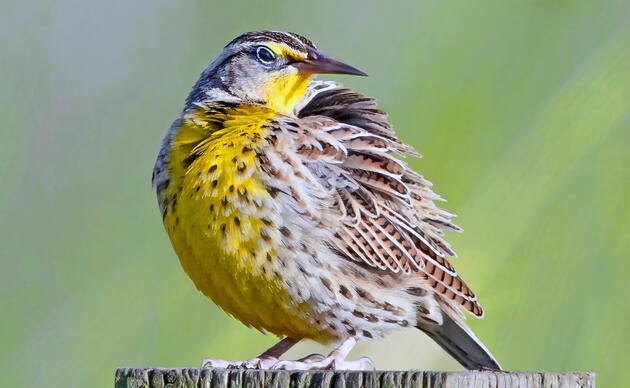The South Dakota and Nebraska Legislative sessions in 2024 were budget focused, while the North Dakota Legislature meets only in odd years. With that in mind, our recent legislative and policy efforts have been focused on increased funding for conservation, natural climate solutions, clean water, and promoting renewable energy. In all three states, the majority of land is privately-owned, much of it working ranches – so our conservation efforts are designed to benefit working lands and invest in regenerative agriculture to support rural communities and families.
North Dakota Conservation Funding
North Dakota Natural Resources Trust has set an ambitious goal to retain 100,000 acres and fund the restoration of 2,000 acres of grassland and wetland habitats throughout North Dakota. Our Executive Director Kristal Stoner and the other NDNRT board members – representing agricultural and environmental organizations – will be working on securing increased federal funds for this work.
The North Dakota legislature did not meet this year, but we are already developing a priority plan based on measures that have been successful in other states.
South Dakota
We were thrilled to see that South Dakota passed a resolution recognizing the unique benefits of grasslands and the importance of farmers and ranchers as managers of this declining ecosystem (SCR 605).
The Game, Fish, and Parks Fund will be getting a new source of funding with conservation license plates (HB 1119), the funding will support habitat development and enhancement on public and private lands. The legislature also passed additional funding for wildfire suppression and prevention (HB 1062) and we will continue to watch legislation and policy relating to fires as prescribed fire is an important management tool. Finally, a measure passed requiring hydrogen pipelines to undergo the same safety requirements and permitting as other pipelines (HB 1034).
Nebraska
Nebraska also appropriated funds to conservation and natural solutions projects, including financial incentives for landowners who voluntarily reduce their use of nitrogen fertilizers (LB 1368), a one-time tax credit for landowners who install a reverse osmosis water system (LB 937), and funding for the DEE to install nitrate sensors in monitoring wells (LB 1184).
Unfortunately, because this session was focused on passing the Governor’s budgetary priorities, multiple conservation bills were indefinitely postponed, including the Riparian and Water Quality Practices Act (LB 40), Wildland Fire Response Act (LB 1243), and establishment of a Pollinator Task Force (LB 828). However, the interest in renewable energy is a sign of trends moving in the right direction, but it will take extensive outreach to make sure legislators understand the ever-changing costs and benefits of emerging technologies.
LB 1335 – A compromise passed
LB 1335 allows the state to override the Nebraska Endangered Species Conservation Act (NESCA) for transportation infrastructure. The original text of the bill was vague and could actually add red tape and lengthened review between state agencies. We offered expert testimony against this bill, alongside multiple other conservation organizations.
An amendment was added that requires an incidental take statement that would specify potential harm to endangered species and steps taken to minimize negative impact, bringing Nebraska into closer alignment with federal regulations. There is also stronger language around designating critical habitat and requiring consultation with the Nebraska Game and Parks Commission. While the amendments soften the blow, this case highlights why we need strong federal protections like the Migratory Bird Act and Recovering Americas Wildlife Act. Thank you for all of our members who reached out to their Senators regarding this bill.
Climate Action Plans and Climate Pollution Reduction Grants
Finally, both Nebraska and North Dakota have submitted Primary Climate Action Plans to the EPA. Over the next year, they will develop Comprehensive Climate Action Plans that will make them eligible for federal block grants for renewable energy infrastructure, habitat conservation, regenerative agriculture programs, and other projects.
Platte River Diversion
On May 23, the Nebraska Department of Natural Resources held a public hearing on the proposed Platte-Republican River Diversion. As you all know, we have been actively opposing this project for more than five years, in partnership with local conservation organizations who work on the Platte River.
The meeting was well-attended, both by local landowners who rely on the Platte and by Nebraska and Kansas agencies tasked with providing water to local communities. Melissa Mosier, Platte River Initiative Program Manager, provided comments on multiple areas of concern, particularly the importance of periodic high-flows in maintaining the Platte’s unique hydrology and habitats.
DNR Director Tom Riley said they expect to come to a final decision by the end of the year.




